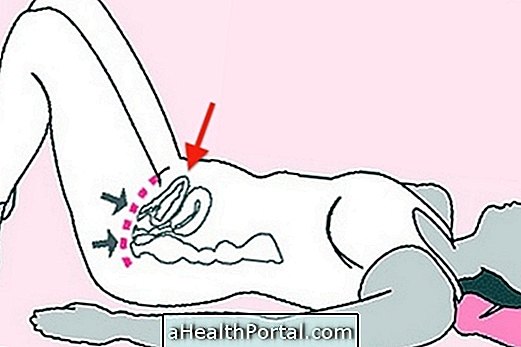Foam urine is usually not a sign of health problems, it is more frequent when you squeeze yourself so you do not go into the bathroom and then urinate very hard or, when there are still cleaning products in the toilet, that end up reacting with the urine and forming the foam.
However, in cases where the foam appears very frequently, it can also indicate the presence of proteins in the urine which can happen due to problems like kidney stones or decompensated high blood pressure. In these cases, it is very important to consult a urologist to assess the cause and guide the most appropriate treatment. See other urine changes that may indicate health problems.
Foamed urine is not a sign of pregnancy but may indicate that the pregnant woman has pre-eclampsia, which is a complication that can lead to seizures or coma if left untreated. See the other common symptoms of pre-eclampsia.

Common causes of urine with foam
Foaming urine can have several causes like:
1. Urinate very hard
When the bladder is too full and tightens not to go right into the bathroom, when you are going to pee, the urine can go out too hard and form foam, however, this type of foam usually disappears in a few minutes.
- What to do : A good way to find out if the foam is formed by tightening too much may be to leave the urine in the vessel for a few minutes before giving the discharge. If this is the cause, no treatment is required. However, holding pee can have health risks. See why you should not hold the pee.
2. Toilet cleaning products
Some cleaning products used in the toilet can react with urine and form foam, not indicating any kind of health problem.
- What to do : A good way to know if it is the cleansing product that is causing the foamy urine is to pee in a clean container. If it does not form foam, it is probably the product, but if it does form foam it is necessary to go to the doctor to assess the cause of foamy urine.
3. Dehydration
When drinking too little water or exercising too much, you can become dehydrated, and your urine becomes more concentrated and foamy. In addition, the urine still has a darker coloration and may even smell stronger. See other signs that may help confirm possible dehydration.
- What to do : If foam is suspected to have arisen from dehydration, you should drink about 1.5 to 2 liters of water per day and drink even more water when you exercise.
4. Presence of protein in urine
One of the main causes of foamy urine is the presence of proteins in the urine. Excessive protein may occur after intense physical exercise, excessive intake of protein supplements, or may be indicative of kidney problems, untreated high blood pressure and diabetes, for example. See the major diseases that can cause protein in the urine.
- What to do : The presence of proteins in the urine can be detected by examining simple urine, which can be done at the pharmacy or at a health post, for example. If it is confirmed, it is important to consult a nephrologist to assess the cause of the presence of proteins in the urine and initiate the most appropriate treatment.

5. Urinary tract infection
A urinary tract infection can cause foamy urine when bacteria enter the bladder. In addition to foamy urine, other symptoms are usually associated with pain or burning when urinating, frequent urination, and blood in the urine. Take our free online test to see if you may have a urinary tract infection.
- What to do: a urine test should be done at the pharmacy or at the urologist. If there is an infection, the urologist should be consulted to know which antibiotic to use.
6. Kidney problems
The kidneys have the function of filtering the blood, resulting in the production of urine which is then eliminated from the body. Any disease or problem that affects the kidneys such as kidney infection, kidney failure, high blood pressure or kidney stones, for example, can cause foamy urine. See 11 other symptoms that may indicate kidney problems.
- What to do: If there is a suspected kidney abnormality, you should go to the nephrologist for tests and identify the cause, initiating the most appropriate treatment.
In addition to these causes, foamed urine in man can also be caused by the presence of semen in the urine. After intimate contact, small amounts of semen can stay in the urethra and go to the bladder when it is malfunctioning, causing foamy urine. This situation should be evaluated and treated by the urologist.
Can urine with foam be pregnancy?
Foam urine is not a sign of pregnancy, however, if the woman is pregnant, foamy urine may indicate the presence of protein in the urine, which may be a sign of pre-eclampsia.
Pre-eclampsia is a complication of pregnancy characterized by high blood pressure, presence of protein in the urine, and swelling of the body that, when untreated, can cause seizures and put the baby at risk. Learn more at: Pre-eclampsia.
























